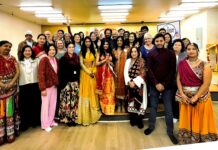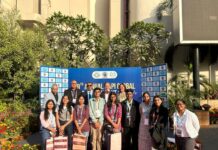Tonya Somesh
Many within the South Asian community believe that immigration enforcement is not “our” issue. Our community operates under the assumption that because we arrived on student, work, or family visas; we are protected from raids and deportations. But this belief is quickly shattering, especially here in Southern California.
 In recent months, ICE (Immigration and Customs Enforcement) activity has escalated in regions with large minority populations, including the neighborhood of Little India in Artesia, California. These raids have striked fear not just within undocumented folks, but has also gone to paralyze the community as a whole.
In recent months, ICE (Immigration and Customs Enforcement) activity has escalated in regions with large minority populations, including the neighborhood of Little India in Artesia, California. These raids have striked fear not just within undocumented folks, but has also gone to paralyze the community as a whole.
South Asians all over Southern California are choosing to stay home and out of the streets. Temples, mosques, and gurdwaras once filled with chatter now hold a deafening silence. South Asians, especially undocumented or out-of-status individuals, have stopped showing up to community events. Community members are missing medical appointments. Grocery stores and restaurants sit quieter than usual. Fear has now become part of the daily routine.
The South Asian Network (SAN), with offices in Little India and Little Bangladesh, has been on the frontlines of this crisis. Since 1990, SAN has worked to advance the health, civil rights, and social justice of South Asians across Southern California. Today, we are responding to the rising fear in our community. SAN is getting calls not just from undocumented individuals, but from folks with green cards, work permits, and even U.S. citizenship.
 We have heard stories from community members who were stopped and questioned by ICE officers. These people are not hooligans or participating in nefarious activities, they were stopped while doing mundane tasks such as: shopping for groceries or walking home from work.
We have heard stories from community members who were stopped and questioned by ICE officers. These people are not hooligans or participating in nefarious activities, they were stopped while doing mundane tasks such as: shopping for groceries or walking home from work.
Last week, SAN hosted a Know Your Rights Town Hall, with the majority of attendees being documented. I had the opportunity to facilitate the session, and what struck me most came during the question session. These were not the usual hypotheticals SAN has heard before; instead individuals asked “What if ICE knocks on my door?” “What if my visa expires?” These questions were urgent, immediate, and deeply personal. People wanted to know how to keep themselves safe, whether they should attend their upcoming court dates, and what would happen if ICE came to their home. By the end of the evening, one thing became heartbreakingly clear: legal status no longer guarantees a sense of safety.
 What is happening in Little India and throughout Southern California is not about law and order. People who are following the rules- attending their court dates, complying with government orders, staying within legal boundaries- are still being targeted. This is not justice.
What is happening in Little India and throughout Southern California is not about law and order. People who are following the rules- attending their court dates, complying with government orders, staying within legal boundaries- are still being targeted. This is not justice.
South Asians are not exempt from this system. We are part of it and increasingly, victims of it. Immigration is a South Asian issue. It touches our parents, our coworkers, our friends, and our neighbors. The fear is here, and it is real.
Organizations like SAN are doing everything they can by offering legal referrals, know-your-rights trainings, trauma support, and advocacy. But we cannot carry this burden alone. We need greater visibility, stronger solidarity, and a louder collective voice saying: this affects us, too. As South Asians we are taught to care for our community and right now our community is hurting.
 Author is Community Organizer at South Asian Network
Author is Community Organizer at South Asian Network







